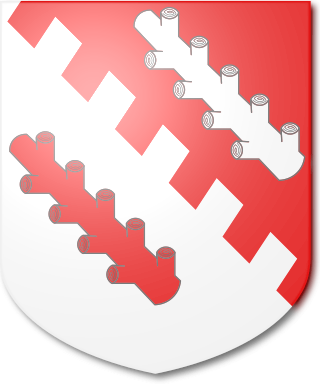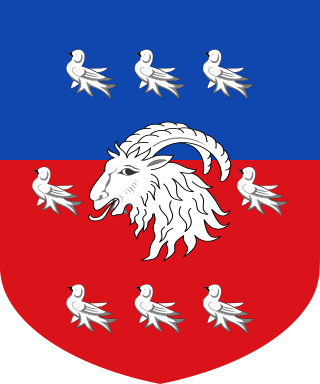
The Antrobus Baronetcy, of Antrobus in the County Palatine of Chester, is a title in the Baronetage of the United Kingdom.

The Bunbury Baronetcy, of Bunbury, Oxon and Stanney Hall in the County of Chester, is a title in the Baronetage of England. It was created on 29 June 1681 for Thomas Bunbury, Sheriff of Cheshire from 1673 to 1674 and the member of an ancient Cheshire family. His grandson, Henry, the third Baronet, and great-grandson, the fourth Baronet, both sat as Members of Parliament for Chester. The latter died unmarried at an early age and was succeeded by his younger brother, the fifth Baronet. He was a clergyman. On his death in 1764 the title passed to his eldest son, the sixth Baronet. He represented Suffolk in the House of Commons for over forty years but is best remembered for his marriage to Lady Sarah Lennox. He died childless in 1821 and was succeeded by his nephew, the seventh Baronet. He was the son of Henry Bunbury, younger son of the fifth Baronet. The seventh Baronet was a distinguished soldier and politician. His eldest son, the eighth Baronet, was High Sheriff of Suffolk in 1868, and Fellow of the Royal Society. He died childless in 1886 and was succeeded by his younger brother, the ninth Baronet. He was Liberal Member of Parliament for Bury St Edmunds. He died unmarried in 1895 and was succeeded by his nephew, the tenth Baronet. He was the son of Colonel Henry William St Pierre Bunbury, third son of the seventh Baronet. He served as High Sheriff of Suffolk in 1908 and was a Deputy Lieutenant of the county. On his death in 1930 the title passed to his son, the eleventh Baronet. He was High Sheriff of Suffolk in 1936 and was a Deputy Lieutenant of the county. His son, the twelfth Baronet, was High Sheriff of Suffolk in 1972. As of 2014 the title was held by the latter's second but eldest surviving son, the thirteenth Baronet, who succeeded in 1985.
The Adair Baronetcy, of Flixton Hall in the County of Suffolk, was a title in the Baronetage of the United Kingdom. It was created on 2 August 1838 for Robert Adair. He was succeeded by his eldest son, the second Baronet. He sat as Member of Parliament for Cambridge. In 1873 he was created Baron Waveney, of South Elmham in the County of Suffolk, in the Peerage of the United Kingdom. The barony became extinct on his death in 1886 while he was succeeded in the baronetcy by his younger brother, Hugh Adair, the third Baronet. The latter had earlier represented Ipswich in Parliament. Two of his sons, the fourth and fifth Baronets, both succeeded in the title. The fifth Baronet's son, the sixth Baronet, was a major general in the British Army. The title became extinct on the latter's death in 1988.

The Bagge Baronetcy, of Stradsett Hall in the County of Norfolk, is a title in the Baronetage of the United Kingdom. It was created on 13 April 1867 for William Bagge, Conservative Member of Parliament for West Norfolk. The sixth Baronet was Chairman of the West Norfolk District Council between 1976 and 1977.

The Cradock-Hartopp Baronetcy, of Freathby in the County of Leicester and of Four Oaks Hall in the County of Warwick, was a title in the Baronetage of Great Britain. It was created on 12 May 1796 for Edmund Cradock-Hartopp, Member of Parliament for Leicestershire. Born Edmund Bunney, he was the husband of Anne Hurlock, granddaughter and heiress of Sir John Hartopp, 4th Baronet, of Freathby. On his marriage in 1777 he assumed the surname of Cradock-Hartopp in lieu of his patronymic according to the wills of his uncle Joseph Cradock and his wife's grandfather. His eldest surviving son Edmund, the second Baronet, died childless and was succeeded by his younger brother, William, the third Baronet. The title then descended from father to son until the death of his grandson, Charles, the fifth Baronet, in 1929.

The Boyle Baronetcy, of Ockham in the Parish of Salehurst in the County of Sussex, is a title in the Baronetage of the United Kingdom. It was created on 14 December 1904 for Edward Boyle, a barrister, businessman and Conservative Member of Parliament for Taunton. His grandson, the third Baronet, was also a Conservative Member of Parliament and ultimately cabinet minister serving as Minister of Education from 1962 to 1964. He was made a life peer as Baron Boyle of Handsworth, of Salehurst in the County of Sussex, in 1970 and became vice-chancellor of the University of Leeds in the same year. The life peerage became extinct on his death in 1981 and he was succeeded in the baronetcy by his younger brother, the fourth Baronet. As of 2024 the title is held by the latter's eldest son, the fifth Baronet, who succeeded in 1983.

There have been two baronetcies created for the Guise family, one in the Baronetage of England and one in the Baronetage of Great Britain. The latter creation is extant as of 2014.
The Greenaway Baronetcy, of Coombe in the County of Surrey, is a title in the Baronetage of the United Kingdom. It was created on 23 October 1933 for Percy Walter Greenaway. He was Chairman of Daniel Greenaway & Sons, printers and stationers, and served as Lord Mayor of London from 1932 to 1933. As of 2015 the title is held by his great-grandson, the fourth Baronet, who succeeded his father in that year.

The Briscoe Baronetcy, of Bourn Hall, in the Parish of Bourn, in the County of Cambridge, is a title in the Baronetage of the United Kingdom. It was created on 12 July 1910 for John James Briscoe. He was a County Alderman, a Justice of the Peace and Deputy Lieutenant for Cambridgeshire. His eldest son, the second Baronet, died childless and was succeeded by his younger brother, the third Baronet. As of 2023 the title is held by the latter's great-grandson, the sixth Baronet, who succeeded from birth in 1994, his father having died earlier that year.

The Broadbent Baronetcy, of Longwood in the Parish of Huddersfield in the West Riding of the County of York, and of Brook Street, in the Parish of St George Hanover Square in the County of London, is a title in the Baronetage of the United Kingdom. It was created on 10 August 1893 for the noted physician William Broadbent, personal physician to Queen Victoria. The title descended from father to son until the death of his grandson, the third Baronet, in 1987. The late Baronet was succeeded by his first cousin once removed, the fourth Baronet. He was the grandson of Walter Broadbent, third son of the first Baronet.

The Boord Baronetcy, of Wakehurst Place in the County of Sussex, is a title in the Baronetage of the United Kingdom. It was created on 18 February 1896 for the Conservative politician Thomas Boord. His eldest son, the second Baronet, died unmarried in 1928 and was succeeded by his nephew, the third Baronet. He was the son of Alexander Edgar Boord, third son of the first Baronet. The third Baronet's eldest son, the fourth Baronet, succeeded in 1975. On his death in 2019, the title passed to his nephew Andrew, an Istanbul-based translator and business development consultant.

The Bonham Baronetcy, of Malmesbury in the County of Wiltshire is a title in the Baronetage of the United Kingdom. It was created on 27 November 1852 for the colonial administrator George Bonham. He was Governor of Hong Kong from 1848 to 1854.

The Wiggin Baronetcy, of Metchley Grange in Harborne in the County of Stafford and of Garth Gwynion in Machynlleth in the County of Montgomery, is a title in the Baronetage of the United Kingdom. It was created on 17 June 1892 for Henry Wiggin. He was the founder of Henry Wiggin and Co Ltd, manufacturers of specialty metal products, and also represented Staffordshire East and Handsworth in the House of Commons. The second Baronet was High Sheriff of Staffordshire in 1896. The third Baronet was a colonel in the army and served as High Sheriff of Warwickshire in 1942. The fourth Baronet was high sheriff of Warwickshire from 1975 to 1976 and a deputy lieutenant of the county in 1985.

The Fletcher, later Boughey Baronetcy, of Newcastle-under-Lyme and of Betley both in the County of Stafford, is a title in the Baronetage of Great Britain. It was created on 24 August 1798 for Thomas Fletcher, of Betley Court, Staffordshire, High Sheriff of Staffordshire in 1783 and 1789 and Deputy Lieutenant of the county. He was the husband of Elizabeth Fenton, granddaughter of George Boughey, of Audley, Staffordshire whose will provided for his great-grandson to inherit the Audley estate.

The ffolkes Baronetcy, of Hillington in the County of Norfolk, is a title in the Baronetage of Great Britain. It was created on 26 May 1774 for Martin ffolkes, FRS later High Sheriff of Norfolk and Member of Parliament for King's Lynn. The second Baronet represented Norfolk and Norfolk West in the House of Commons while the third Baronet represented King's Lynn. The fifth Baronet was Honorary Chaplain to Queen Victoria, Chaplain-in-Ordinary to Edward VII and George V and Chaplain to Edward VIII and George VI.

The Smith, later Smith-Marriott Baronetcy, of Sydling St Nicholas in the County of Dorset, is a title in the Baronetage of Great Britain. It was created on 1 June 1774 for John Smith, High Sheriff of Dorset in 1772. The second Baronet married Elizabeth Anne, daughter of Reverend James Marriott. The fourth Baronet assumed by Royal sign-manual the additional surname of Marriott. The fifth Baronet was High Sheriff of Dorset in 1873.

The Hoghton or Houghton, later Bold-Hoghton, later de Hoghton Baronetcy, of Hoghton Tower in the County of Lancashire, is a title in the Baronetage of England. It was created on 22 May 1611 for Richard Hoghton, Member of Parliament for Lancashire. The Hoghton family had been landowners in Lancashire since the reign of King Stephen and had been Knights of the Shire for Lancashire since the 14th century. The second Baronet represented Clitheroe and Lancashire in the House of Commons and was a Royalist leader during the Civil War. The third and fourth Baronets both sat as Members of Parliament for Lancashire. The fifth Baronet was Member of Parliament for Preston and East Looe while the sixth and seventh Baronets represented Preston. The eighth Baronet assumed the additional surname of Bold. In 1892 the ninth Baronet resumed, by Royal licence, the ancient family surname of de Hoghton.

The Buckworth, later Buckworth-Herne, later Buckworth-Herne-Soame Baronetcy, of Sheen in the County of Surrey, is a title in the Baronetage of England. It was created on 1 April 1697 for John Buckworth, High Sheriff of London in 1704. The second Baronet sat as Member of Parliament for Weobley. The third Baronet was Assistant Gentleman Usher to George II. The fifth Baronet was Gentleman-Pensioner and Exon of the Guard during the reign of George III. He married Anne, daughter of Paston Herne, of Haveringland Hall, Norfolk, and assumed by Royal licence the additional surname of Herne. The sixth Baronet assumed in 1806 by Royal licence the additional surname of Soame in compliance with the will of Sir Peter Soame, 4th Baronet, of Thurlow. The ninth Baronet was a member of the Shropshire County Council.

The Palmer Baronetcy, of Carlton in the County of Northampton, was created in the Baronetage of England on 7 June 1660 for the lawyer and politician Geoffrey Palmer. The second Baronet was Member of Parliament for Higham Ferrers. The third, fourth and fifth Baronets all represented Leicestershire in the House of Commons. The fifth Baronet served as High Sheriff of Leicestershire in 1782 and the eighth Baronet as High Sheriff of Northamptonshire in 1871.

The Hudson, later Palmer Baronetcy, of Wanlip Hall in the County of Leicester, was created in the Baronetage of Great Britain on 28 July 1791 for Charles Grave Hudson, a Director of the South Sea Company and High Sheriff of Leicestershire in 1784. In 1813 the second Baronet assumed by royal sign-manual the surname of Palmer in lieu of his patronymic on succeeding to the estates of his maternal grandfather, Henry Palmer, of Wanlip. The title vests in its ninth holder.


















